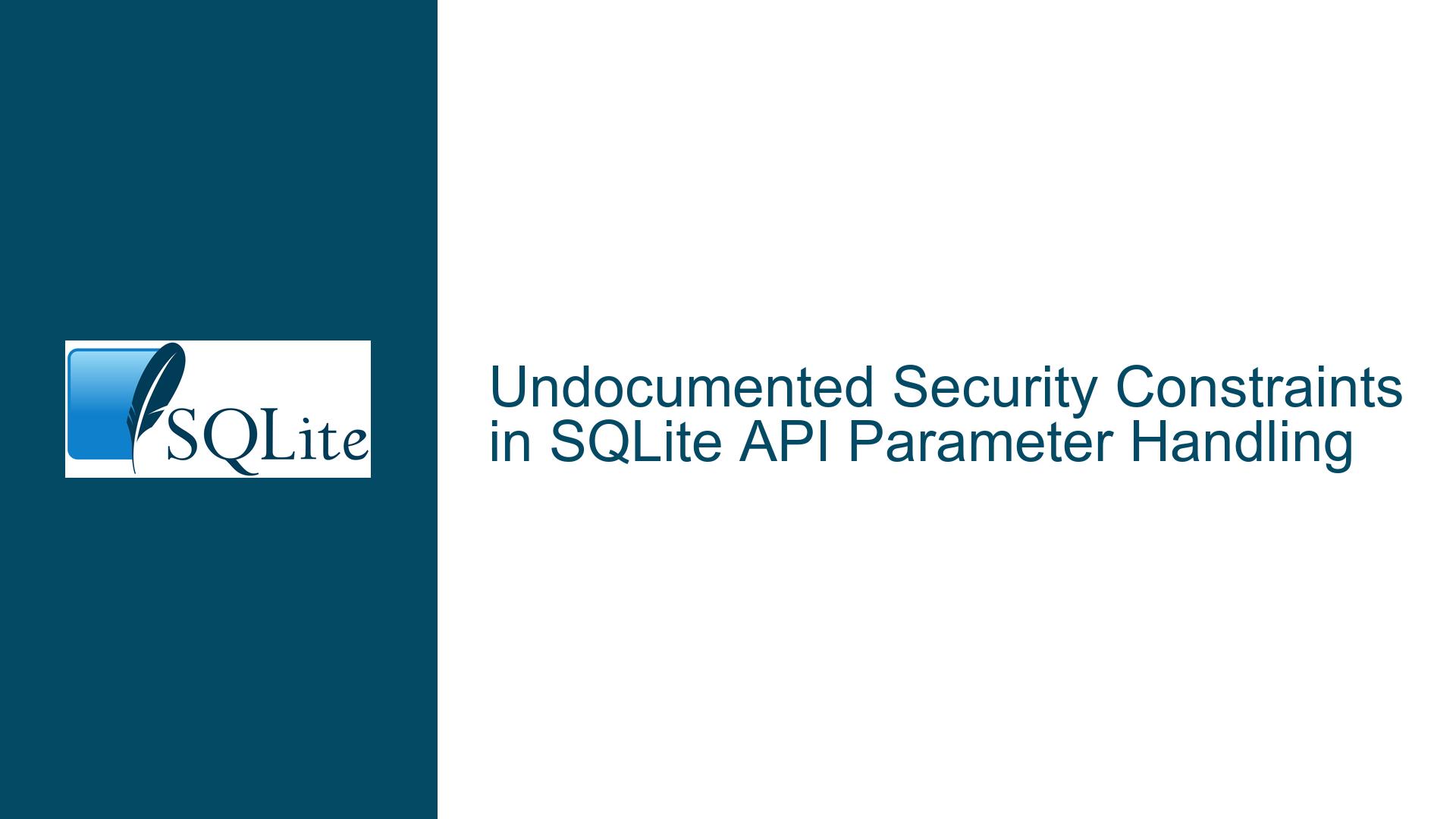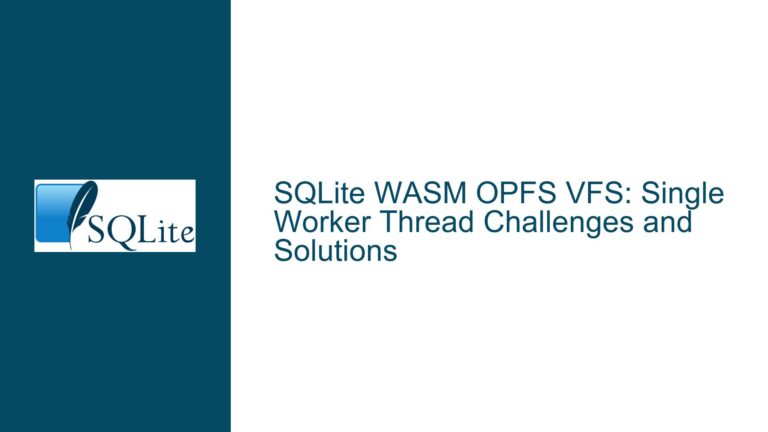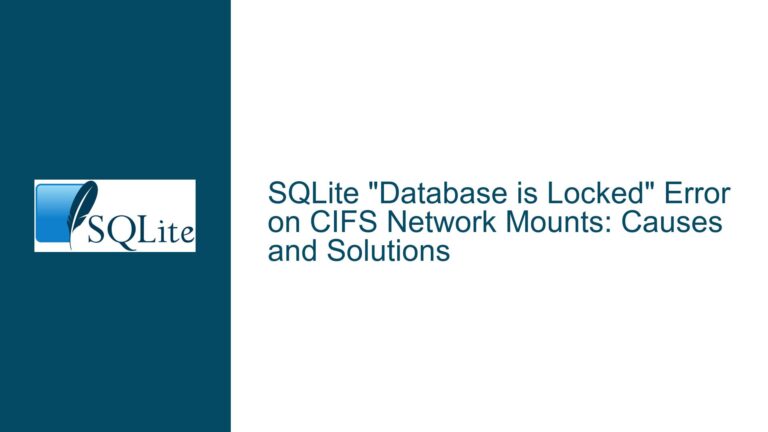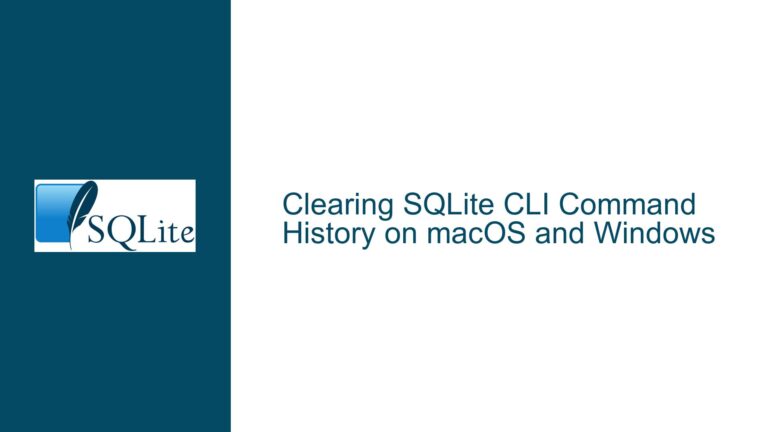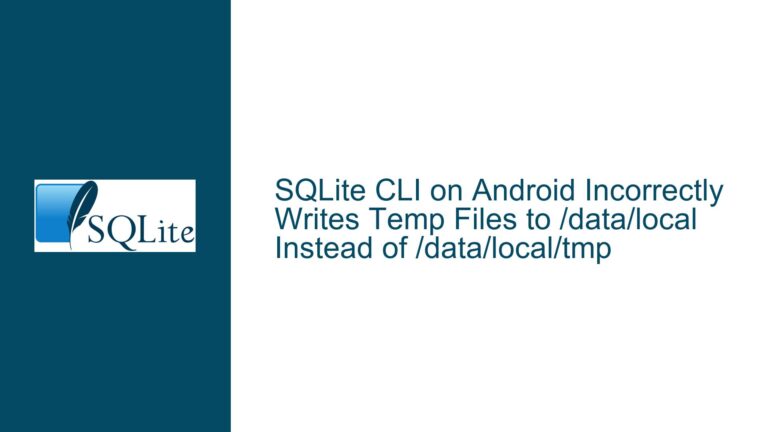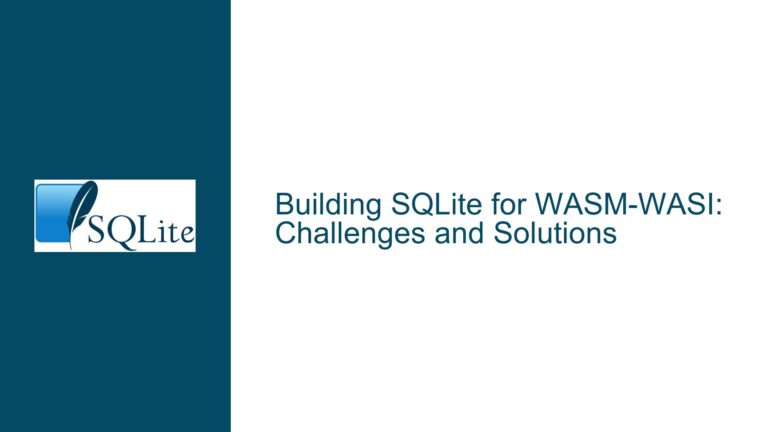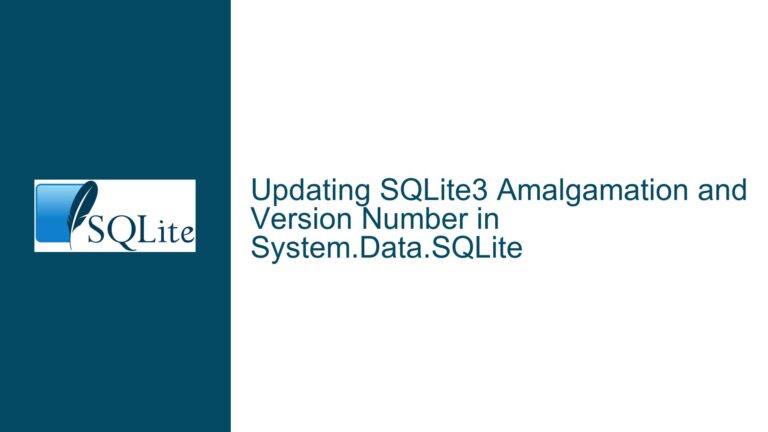Undocumented Security Constraints in SQLite API Parameter Handling
Security Risks Stemming from Implicit API Usage Requirements
The SQLite C/C++ interface provides developers with extensive control over database operations, memory management, and runtime configuration. However, several APIs carry implicit security constraints that are not explicitly documented, leading to misuse patterns that introduce vulnerabilities such as use-after-free, double-free, buffer overflows, and undefined behavior. These risks arise when developers misinterpret ownership semantics, parameter initialization requirements, or lifetime management rules for objects like sqlite3_str, sqlite3_mutex, and dynamically allocated strings. For example:
sqlite3_str_finishtransfers ownership of a dynamically built string buffer to the caller while destroying the underlyingsqlite3_strobject. Using the originalsqlite3_strobject after calling this function violates memory safety.sqlite3_mprintfandsqlite3_snprintfrequire strict validation of format specifiers to prevent adversarial control over buffer boundaries.sqlite3_create_modulemandates that thezNameparameter remain immutable and valid for the duration of its registration, even though SQLite internally copies the string.
These constraints are often inferred from general programming principles but are not codified in API documentation, creating ambiguity for developers unfamiliar with SQLite’s internal memory management model. The absence of explicit warnings exacerbates risks in large codebases where ownership transfer patterns are non-trivial.
Ambiguity in Object Lifetime Management and Parameter Initialization
The root causes of these security risks stem from three primary factors:
1. Implicit Object Ownership Transfer Without Clear Destructor Semantics
APIs like sqlite3_str_finish and sqlite3_mutex_free involve irreversible state changes that invalidate their input parameters. For instance, sqlite3_str_finish acts as a destructor for sqlite3_str objects, but the documentation does not explicitly state that the object becomes unusable after this call. Developers accustomed to RAII (Resource Acquisition Is Initialization) patterns in higher-level languages may incorrectly assume the object remains valid if not null-checked. Similarly, sqlite3_mutex_free requires that the same mutex handle not be freed multiple times, but this is only implied through the function’s naming convention rather than explicit documentation.
2. Unenforced Preconditions for Parameter Validity
Several APIs require parameters to adhere to specific initialization or immutability rules that are not enforced at compile time or runtime:
sqlite3_declare_vtabandsqlite3_result_subtypedemand that their input parameters be initialized through specific companion APIs (e.g.,sqlite3_vtab_config). Without this, the parameters may reference invalid memory or uninitialized data structures.sqlite3_execandsqlite3_get_tableexpect their error message output parameters (e.g.,pzErrMsg) to point to pre-initialized memory orNULL. While passing uninitialized pointers technically violates C/C++ conventions, the lack of explicit guardrails increases the risk of null pointer dereferences.
3. Assumptions About Developer Familiarity with Low-Level Memory Management
SQLite’s API design assumes proficiency in manual memory management, which is reasonable given its C-language focus. However, this leads to under-documentation of constraints that are considered "common knowledge" for experienced developers but opaque to newcomers. For example:
sqlite3_snprintfrequires the caller to ensure the output buffer size (n) is at least as large as the formatted string. Violating this introduces stack or heap overflows, but the documentation does not emphasize the catastrophic consequences of undersized buffers.sqlite3_create_module’szNameparameter is copied internally, but the documentation does not clarify whether the original string can be safely modified or freed after registration. This leads to unnecessary restrictions or premature deallocations in user code.
Remediation Through Documentation Updates and Static Analysis Integration
To mitigate these risks, developers must adopt a combination of documentation hygiene, static code analysis, and defensive programming practices:
1. Enhance API Documentation with Explicit Lifetime and Initialization Directives
- Clarify Object Ownership Transfers: For APIs like
sqlite3_str_finish, append usage notes such as:"After calling this function, the input
sqlite3_strobject is invalidated and must not be used unless reinitialized. The returned buffer is owned by the caller and must be freed usingsqlite3_free." - Parameter Initialization Requirements: For
sqlite3_declare_vtab, explicitly state that theCREATE TABLEstatement must be generated throughsqlite3_mprintfor similar SQLite-managed APIs to ensure proper memory alignment. - Format String Hardening: In
sqlite3_mprintfdocumentation, add warnings such as:"The format specifier (first parameter) must be a string literal or rigorously sanitized to prevent adversarial format string exploits. User-controlled input must never directly dictate format specifiers."
2. Adopt Compiler-Assisted and Static Analysis Checks
- Enable compiler flags like
-Wformat-securityand-Wformat-nonliteralto catch risky uses ofsqlite3_mprintfandsqlite3_snprintf. - Integrate static analyzers like Clang’s
scan-buildor Coverity to detect use-after-free patterns involvingsqlite3_stror double-free errors withsqlite3_mutex_free. - Use custom annotations or SAL (Source Code Annotation Language) to mark parameters with strict lifetime requirements. For example:
_Ret_notnull_ _Post_invalid_ sqlite3_str* sqlite3_str_finish(sqlite3_str*);
3. Defensive Coding Practices for High-Risk APIs
- Immutable Strings for Module Registration: When using
sqlite3_create_module, passzNameas a string literal or a static buffer to avoid accidental modification:static const char* MODULE_NAME = "vtab_impl"; sqlite3_create_module(db, MODULE_NAME, &vtab_methods, NULL); - Guard Clauses for Mutex Handling: Wrap
sqlite3_mutex_freein a macro that nullifies the mutex pointer after freeing:#define SQLITE3_MUTEX_FREE(p) do { \ if (p) { sqlite3_mutex_free(p); (p) = NULL; } \ } while (0) - Preinitialized Output Parameters: Initialize
pzErrMsgtoNULLbefore passing it tosqlite3_exec, and check for allocation failures:char* errMsg = NULL; int rc = sqlite3_exec(db, sql, callback, 0, &errMsg); if (rc != SQLITE_OK) { // Handle errMsg sqlite3_free(errMsg); }
By systematically addressing these gaps through documentation updates, toolchain integration, and defensive coding patterns, developers can reduce the incidence of memory corruption vulnerabilities and undefined behavior in SQLite-dependent applications.
